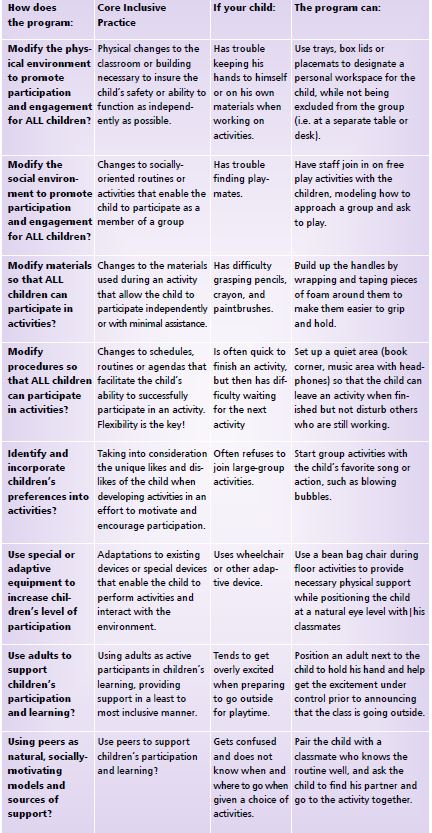EP LOOKS BACK: MARCH 2008
Finding a Preschool Where ALL Children Are Welcome
Tips for Evaluating the Inclusive Practices of Private Preschool Programs
By Amy Nicholas, Ph.D.

What is a "typical" preschool er's natural environment? More likely than not, one would say either at home. a daycare program. or community private preschool. On the contrary. three- and four-year-old children with disabilities receiving public special education services are often enrolled in programs where they attend their neighborhood elementary schools for part of the day or only a couple of days a week. In addition. these programs are frequently in segregated classrooms away from their peers without disabilities. So. for households with working parents. what about the rest of the week7 And what about opportunities for the children to interact with other children without disabilities? For parents with these concerns, the search for a private preschool becomes eminent.
It may be news to some parents that private preschool programs are nor required to adhere to the federally mandated legislation for public schools. known as the Individuals with Disabilities Education Act (IDEA). which states that all children are entitled to access to an education that meets their individualized needs regardless of the nature or intensity of their disability. While the Americans with Disabilities Act (ADA) requires private programs to make reasonable efforts to enroll children with disabilities. mean ing they can not simply deny admission based on the child's disability alone. it does allow programs to turn away a child if the needed modifications or accommodations will cause undue financial strain on the program or will involve a.n altering of the program's fundamental structure. So. while many private programs advertise open-door policies related to enrolling children with special needs. there is no actual guarantee that all children will be accepted and that, if given a chance. all children will be able to remain in the program if their needs cannot be met. In many cases. parents of young children with disabilities scramble to find programs in which their children are welcome and can fully participate. The concept of full. side-by-side participation in all program activities by children with and without disabilities is known as "inclusion."
The benefits of inclusion have long been revered by educational researchers. Benefits for children with disabilities include enhanced self-esteem and self-respect stemming from being a part of their community, stimulation of social and language skills through peer models, and facilitation of friendships. Similarly, studies have found numerous benefits for children with typical development as well. such as increased awareness and acceptance of diversity and enhanced feelings of empowerment from helping others succeed. With benefits evident for children with and without disabilities alike. it becomes apparent why it is important for all parents to be able to identify programs that demonstrate effective inclusive practices. But, what does an effective inclusive program look like?
What questions should parents ask when shopping around for programs for their children? The chart to the right provides suggested questions to ask of program administrators, a brief description of the core inclusive practices addressed in each question, and specific examples of possible obstacles and practical suggestions for overcoming them. Discussing the suggested questions with program staff can provide immediate insight as to how they feel about inclusion and what supports they put in place to help ensure that all children are successful.
While there are specific things parents need to find out about a program, they too need to be sure to be open and forthright about the child's needs. Parents should be sure to tell program staff about any special medical or dietary instructions; their expectations for discipline and home communication; the child's strengths, abilities, and favorite activities; and things that are difficult for the child. Keeping lines of communication open and honest from the very start is essential to establishing a trustworthy thy, collaborative relationship with the pro gram's staff. In general. it is important to remember that the teachers and administrators who work in these programs are there because they love children (they are certainly not there to become rich). So, more likely than not, if they truly feel they can do what is in the child's best interest, they will.
Now, where to begin? Locating preschool programs that are accredited by the National Association for the Education of Young Children ( naeyc.org) is a good starting place on your journey to finding the best fit for your child. Checking with local child care and referral agencies is also a good first step. To find offices by city and state, visit the federal Child Care Awareness Bureau website child- careaware.org).
References that accompany this article may be requested by writing to jhollingsworth@eparent.com.•
Amy Nicholas, Ph.D., is an assistant professor of special education at Towson University in Maryland. Amy has worked on a variety of training initiatives aimed at increasing access to community programs for young children ·with disabilities. Her areas of research interest include high-risk infants, early childhood assessment, and family-professional collaboration. She can be reached at alnicholas@towson.edu.
